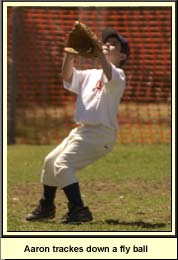Outfield
Need for Fundamentals
When watching a Major League game I'm often amazed at the number of times I see a lack of fundamentals when it comes to playing the outfield. In the World Series between the Giants and Angels a runner scored on a shallow fly ball to right field simply due to the outfielder playing the ball so poorly. It wasn't a difficult catch, there wasn't any sun in his eyes. He simply drifted on the ball and was backing up as he caught it. The runner recognized the opportunity and scored on a play he normally wouldn't have had a chance on. This is just one example of many that can be seen daily in Major League games. I really don't understand why Major League Managers put up with poor play in the outfield. They would never stand for it from their infielders. This is not to say that there aren't some amazing defensive outfielders in the game, but more to point out that the expectations of defensive performance in the outfield seems to be lower.

You may agree or disagree, but either way you're probably wondering what my opinion on this subject has to do with coaching youth baseball? It has to do with the value and priority you as a coach place on building a strong defensive outfield. If defensive play at the pro level seems to be held to a lower standard than other positions, do you think it's not at the youth level also? Many coaches want to hide players in the outfield and hope that they don't see much action. I'm not saying a coach should move his/her best players to left or right field, but I would suggest that by teaching outfield skills and raising the expectations, you can see significant improvement in the defensive ability of your outfield. As a coach you need to realize that outfield play can be improved drastically by implementing a system that emphasizes the importance of outfield play to the success of each play during a game.
Coach and Player Expectations
Due to the fact that outfielders often see less action than other players, it can be difficult for a player to stay mentally focused on the game. I'm sure we've all seen a ball being hit into the outfield and the player not being "in the game". While it's an embarrassing situation, it's also easy to understand. As coaches, we need to try and redefine for our players the definition of "action". Most players will consider action to be an opportunity to make a play with the ball. You need to try and relate to your players that action really is the act of being in the proper position to make a play. It requires hustle and paying attention to the game and can be achieved on each and every play during a game, whether the player touches the ball or not. If your players buy this definition of action, you will be much closer to having an outfield that is ready on each and every play during a game.
Turning Expectations into Results
Definition is one thing, results are another. As a coach how can I keep my outfielders focused? In the section Outfield Approach, a pitch by pitch preparation from a player standpoint is discussed. While this will help to keep an outfielder focused, it is really secondary to you defining the role of the outfielder and the expectations that go along with it. Each player on the field has a role on each and every play during a game and that includes the outfielders.
Here's an example that you will see over and over again in youth leagues. An overthrow is made at a base. The ball rolls into the outfield where the outfielders were simply standing in their positions, the runner takes an extra base, maybe two. The coach yells out to the outfielders, "Why weren't you backing up?" The players simply shrug their shoulders and go back to their positions. They have no answer. It may have been discussed at practice, but they hadn't been backing up all game and the coach didn't say a word. How were they supposed to know there was going to be an overthrow?
Even though the coach may have talked about the importance of backing up during practice; by not mentioning it during the times when it didn't result on a chance to get the ball, he/she undermined the importance. In the section Backing Up the subject of where to be on each play is discussed in more detail. For now, the important thing to emphasize to your outfielders, is the value they provide to the team when they stay in the game on each and every play. Simply telling them won't be enough. You must provide positive feedback during practices and games when players hustle to the proper spot.
Coaching Advice
- Emphasize the importance of the outfield being involved in every play.
- Give positive feedback during practice and games when outfielders are in the correct position (whether they were needed on the play or NOT).
- If they are not in the correct position, discuss between innings so they understand what is expected of them.
- Realize that it takes time for players to learn where they are supposed to be in different situations.
- Have a default spot for them to go if the ball is not hit to them. See Outfield - Backing Up
The remainder of the Outfield section discusses the skills necessary to become a good outfielder. Too often the skills are developed, but the kids still fail to perform the skill because they're simply not focusing during the game. Outfield Approach and Backing Up will give you some strategies to help keep your outfielders "in the game".
Outfield Topics
Most Recent Blog Posts
Working With Players on Focusing on the Correct Part of the Baseball when Hitting (October 15 2016)
Getting More Accurate Throws From Your Team (April 5 2016)
First let me start by saying that I have thoroughly enjoyed your website for several years. The information you put on there is so perfectly to the point and simple to understand. You have done a great job with it.
- Mark C.







